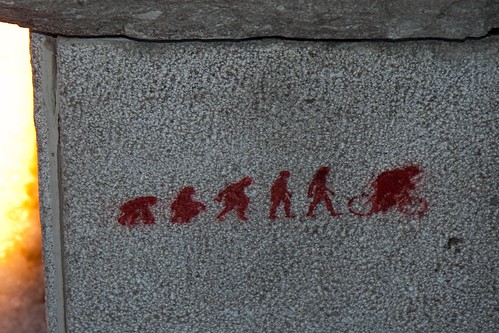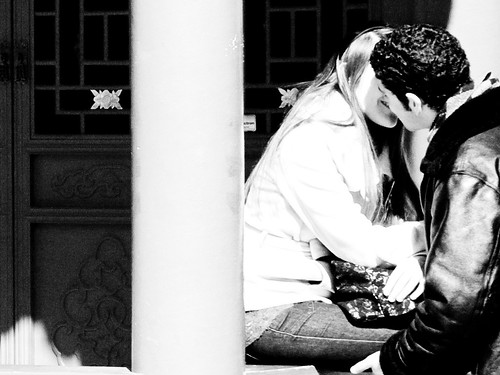
Tuesday, March 31, 2009
Monday, March 30, 2009
Sunday, March 29, 2009
Somewhere, an Indian is crying.

Every time I see a Native American in some traditional dress, it reminds me of the 70s public service announcement made by the United States on how to stop pollution.
www.videosift.com/video/1970s-Pollution-PSA-Crying-Indian
Saturday, March 28, 2009
Friday, March 27, 2009
The right side of the trackis
Thursday, March 26, 2009
Wednesday, March 25, 2009
Animals
Tuesday, March 24, 2009
Watchman Nee
So I've been recommended the Normal Christian Faith by Watchman Nee as something to read. While I have not read the entire tract, I do not like the tone he suggests. He writes and talks like a politician, using circular reasoning and fear tactics to 'scare' you into believing in Christianity.
Neither are his arguments new. The only problem is that he butchers them, and instead rely on cheap presentations of coinciding evidence to convince the reader. He brings into the extremes of any argument to make his point and picks at diction in order to satisfy his arguments.
He derides all atheists as immoral. Looks at patterns as if they were the will of God. And he picks at language out of context so that it would make his point. He is certainly good at rhetoric for the uninformed or as a preacher not giving his congregation a chance to think. But it is a argument filled with seams and bias. And I'm only on chapter 1.
Converting to Christianity is all well and good, but this would not be the way to do it. And no, I'm not converting to Christianity. But I would read stuff like this in order to support my arguments against organized religion.
And to counter his points. True atheists are moral. It does not fit his side's definition of morality, so he dismisses it. And some Christians are just as immoral as atheists. At least Atheists don't rely on someone else to define right or wrong. And some people with the strongest conviction and morality I have met are atheist or agnostic by nature. A code of conduct or morality forced upon a person by a God is not as binding as one that is chosen by oneself. The very fact that there is absolute morality given by a God or the words of God would have less of an impact upon a person than a set of relative morality chosen by someone else. Morality with religion is a packaged deal. You don't treasure something that comes in a package as much as something you have chosen for yourself.
And he implied that the fact that there is order reveals the existence of God. I call bull. In my words, "Order is our imposition of will upon Chaos." Everything can be seen as chaos. It is only our brain, through our own perception, that groups things into perceivable 'order'. And note here, that the order I'm talking about, is not entropy. I'm talking about metaphysical order. If you want to talk about God as order though, then God will eventually die, because the second law of Thermodynamics projects that we'll all end up as meaningless sameness with no energy and total chaos.
Plus, it could very well be that the leaf or cells or organisms could only be built one way. And the mathematical laws that bound us only allow one way of making something in the world. Correlation does not imply Causation! That's a very common sidestep in logic that allow us to claim a lot of things. It's hard to prove causation, but that is what must be proved here, not correlation. Watchman Nee also sprouts off examples such as ones about individual prayers being answered. Correlation does not prove causation.
Lastly, even if I accept the fact there is a God, it does not mean that the God of Abraham is the correct god. There could be a creator that plays the universe like someone playing Sim City or Life. It decides the rules ahead of time, and then let's the model run. There is no evidence or requirement that it cares for the individual lives of people.
Maybe there's something between the lines I should read. But it's hard to say. Should not a book instructing or persuading people to ascribe to a religion be straightforward and influence people directly rather than contradict or satirize itself? I really hope so. While I don't suppose that science is a replacement for religion or philosophy, I think that it allows better metaphors and analogies to what we're trying to express. Faith is always a touchy subject. But at least I know what I believe. I did so only after looking at religions, myth, legends around the world. How many people just follow their beliefs unquestioningly or just adopt the most convenient one?
Organized religion and faith is too dangerous and too subjective. It is a weapon in the right hands and can cause so much destruction and hatred. What we need is information about every religion and let people choose themselves. I respect the morality of the Christians, but I cannot accept their faith.
Neither are his arguments new. The only problem is that he butchers them, and instead rely on cheap presentations of coinciding evidence to convince the reader. He brings into the extremes of any argument to make his point and picks at diction in order to satisfy his arguments.
He derides all atheists as immoral. Looks at patterns as if they were the will of God. And he picks at language out of context so that it would make his point. He is certainly good at rhetoric for the uninformed or as a preacher not giving his congregation a chance to think. But it is a argument filled with seams and bias. And I'm only on chapter 1.
Converting to Christianity is all well and good, but this would not be the way to do it. And no, I'm not converting to Christianity. But I would read stuff like this in order to support my arguments against organized religion.
And to counter his points. True atheists are moral. It does not fit his side's definition of morality, so he dismisses it. And some Christians are just as immoral as atheists. At least Atheists don't rely on someone else to define right or wrong. And some people with the strongest conviction and morality I have met are atheist or agnostic by nature. A code of conduct or morality forced upon a person by a God is not as binding as one that is chosen by oneself. The very fact that there is absolute morality given by a God or the words of God would have less of an impact upon a person than a set of relative morality chosen by someone else. Morality with religion is a packaged deal. You don't treasure something that comes in a package as much as something you have chosen for yourself.
And he implied that the fact that there is order reveals the existence of God. I call bull. In my words, "Order is our imposition of will upon Chaos." Everything can be seen as chaos. It is only our brain, through our own perception, that groups things into perceivable 'order'. And note here, that the order I'm talking about, is not entropy. I'm talking about metaphysical order. If you want to talk about God as order though, then God will eventually die, because the second law of Thermodynamics projects that we'll all end up as meaningless sameness with no energy and total chaos.
Plus, it could very well be that the leaf or cells or organisms could only be built one way. And the mathematical laws that bound us only allow one way of making something in the world. Correlation does not imply Causation! That's a very common sidestep in logic that allow us to claim a lot of things. It's hard to prove causation, but that is what must be proved here, not correlation. Watchman Nee also sprouts off examples such as ones about individual prayers being answered. Correlation does not prove causation.
Lastly, even if I accept the fact there is a God, it does not mean that the God of Abraham is the correct god. There could be a creator that plays the universe like someone playing Sim City or Life. It decides the rules ahead of time, and then let's the model run. There is no evidence or requirement that it cares for the individual lives of people.
Maybe there's something between the lines I should read. But it's hard to say. Should not a book instructing or persuading people to ascribe to a religion be straightforward and influence people directly rather than contradict or satirize itself? I really hope so. While I don't suppose that science is a replacement for religion or philosophy, I think that it allows better metaphors and analogies to what we're trying to express. Faith is always a touchy subject. But at least I know what I believe. I did so only after looking at religions, myth, legends around the world. How many people just follow their beliefs unquestioningly or just adopt the most convenient one?
Organized religion and faith is too dangerous and too subjective. It is a weapon in the right hands and can cause so much destruction and hatred. What we need is information about every religion and let people choose themselves. I respect the morality of the Christians, but I cannot accept their faith.
Tranquility
Monday, March 23, 2009
Around the Bend
Sunday, March 22, 2009
Saturday, March 21, 2009
Friday, March 20, 2009
Simple Innocent Fun
Thursday, March 19, 2009
La Fenêtre chez Le Cartet

The window at Le Cartet is big and wide. Natural sunlight is usually drowned out by soulless fluorescent light. Not here though. The artificial lighting was dim. Even though the sunlight did not extend throughout the long room at Le Cartet, the light's innate healing quality could not be denied as we enjoyed our delicious brunch.
Wednesday, March 18, 2009
Tuesday, March 17, 2009
Saturday, March 07, 2009
Watchmen
I haven't seen a movie out on the first day for a long time. Watchmen, while being good, was not awesome. To me, there were some scenes that could have been skipped. It's like the sex scenes in there were thrown there just to lengthen the film.
The question is this: take any situation and gather 4-5 different viewpoints and reactions from a moral metric. How do we decide which moral relative viewpoint we should hold?
Me? I know what my moral viewpoint is. But like politics and religion, how you stand on whether the end justify the means is one that no one talks about. Because at the very core of the question is your identity and how humans other people perceive you to be.
Life's going okay. It could be better, as usual, but not bad.
The question is this: take any situation and gather 4-5 different viewpoints and reactions from a moral metric. How do we decide which moral relative viewpoint we should hold?
Me? I know what my moral viewpoint is. But like politics and religion, how you stand on whether the end justify the means is one that no one talks about. Because at the very core of the question is your identity and how humans other people perceive you to be.
Life's going okay. It could be better, as usual, but not bad.
Subscribe to:
Comments (Atom)















